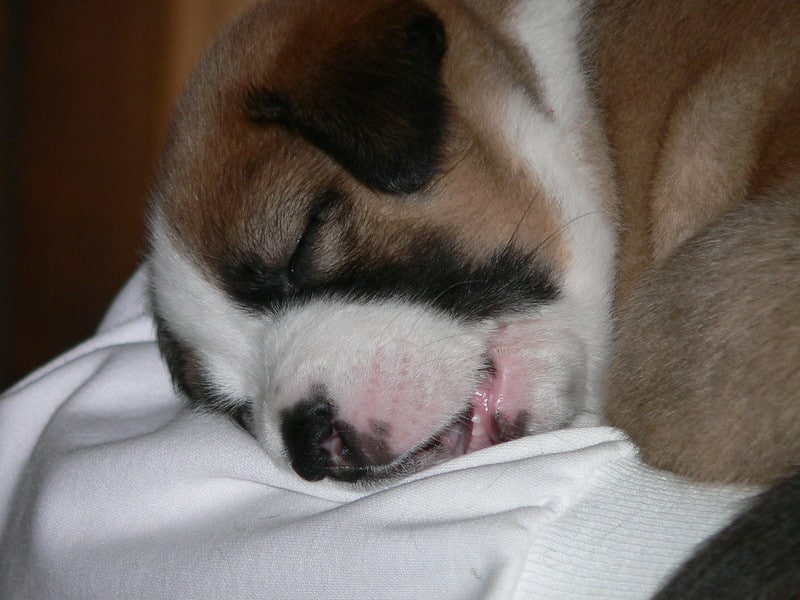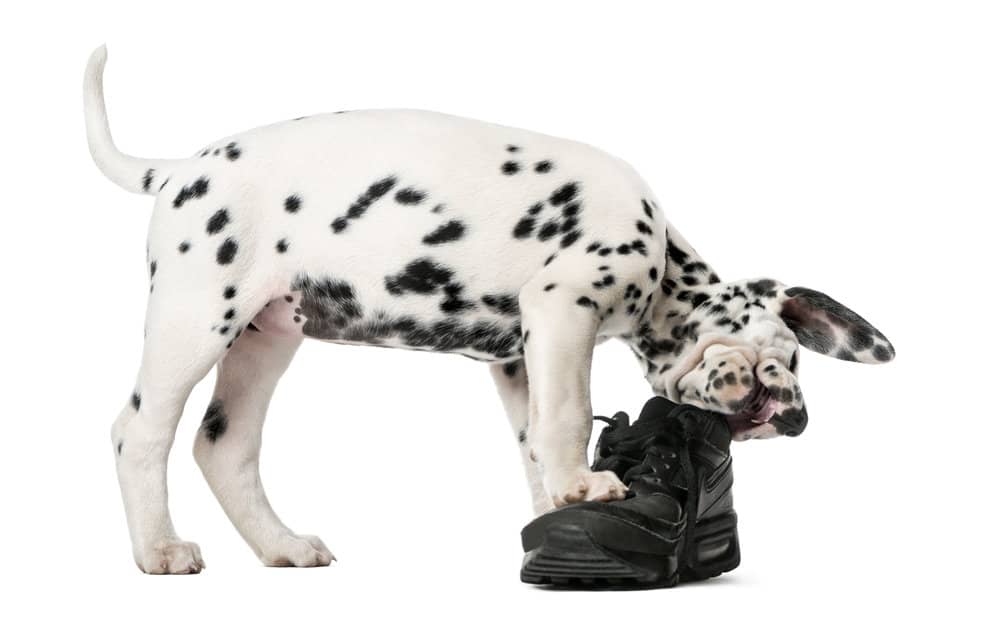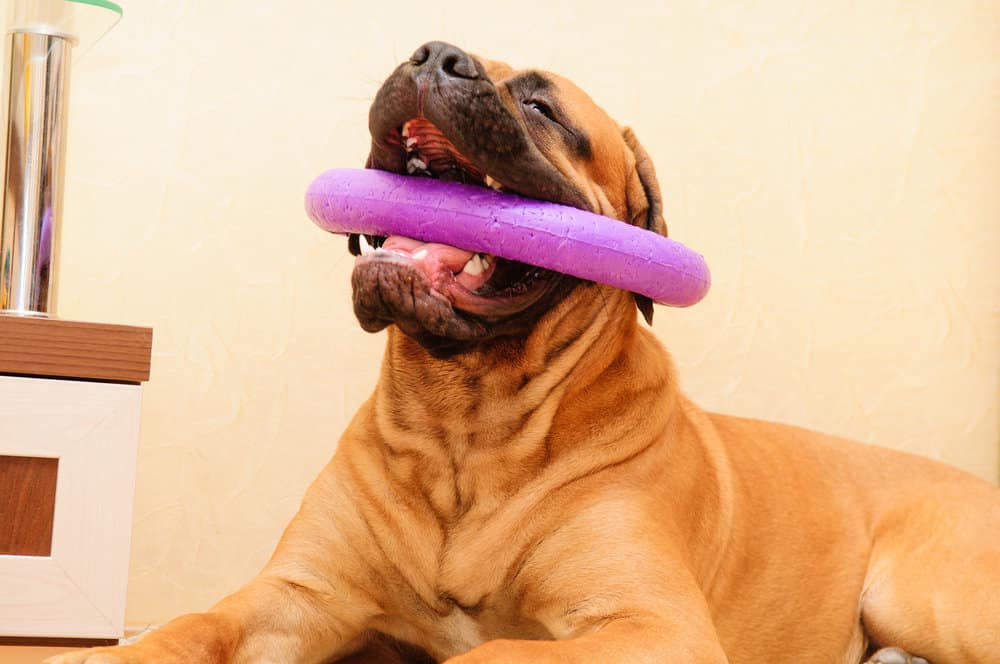Puppies are such fragile little things, and as they start teething, they often show many signs of distress. So, can teething cause vomiting in puppies? Well, not typically, but yes, it can.
Teething can sometimes pass unnoticed for some dogs. However, it could also cause a host of symptoms, like drooling, whining, swollen gums, and increased chewing.
Vomiting isn’t among the common signs of teething, and it often happens as a result of another symptom.
For example, a puppy could ingest an irritating substance because it’s chewing on everything.
In this article, we’ll discuss how teething could lead to vomiting in puppies. Also, whether or not you need to consider other reasons for the puppy’s vomiting.
How Can Teething Cause Vomiting in Puppies?

Most sources wouldn’t list vomiting as a direct result of a puppy’s teething. Here are some of the indirect ways that teething could lead to vomiting.
Inability to Chew Food
Dogs of all ages need to chew their food thoroughly to be able to digest it and metabolize it.
Teething puppies often find chewing their food a bit difficult, since their gums hurt. You can tell by all the whining. They just swallow their food without chewing.
The little puppy’s stomach would probably reject the raw unchewed food. And the normal reaction to that is throwing up the food.
One of the signs that this has happened is observing the shape and consistency of the vomit. If the food is clearly unchanged, then the puppy couldn’t break it up by powerful chewing.
A quick solution for that is giving the puppy wet soft food throughout that teething period.
Helpful Dog Training Resource:
For help with training your dog, you should take a look at The Online Dog Trainer by Doggy Dan. Doggy Dan is an expert Dog Trainer based in New Zealand. His online resource contains Hundreds of Excellent Dog Training Videos that will take you step-by-step through the process of developing a healthy, happy well-behaved dog.
Not Eating Any Food
Some puppies feel significant discomfort as soon as they start eating anything at all. Thus, they just steer clear of food as long as possible.
During this time, the puppy’s stomach accumulates acid, but there’s nothing to digest. The excessive build-up of acid soon affects the lower esophageal sphincter, which causes acid reflux.
This severe reaction could lead to vomiting. The puppy would appear to be in a lot of pain, and the vomit would be a greenish-yellow solution.
Ingesting a Chunky Object

The coming-up teeth often drive the puppy to chew on anything and everything. Shoes, carpets, the filling of a sofa, or your mobile phone.
Some of these objects would only scratch or tear, while others might not stay in one piece. The puppy could easily ingest a chunky bit of rubber or sponge while training its new teeth.
Swallowing a sizable object is close to impossible for a little puppy. The natural reaction, in that case, is throwing up.
Actually, this is a much better outcome than the object getting stuck in the puppy’s throat!
Eating a Bad Substance
This situation is similar to the previous case; the puppy chews on the wrong thing. A toxic substance, or irritant, would immediately cause the puppy to start throwing up.
Unfortunately, the vomiting might not stop right away, depending on the degree of toxicity of the ingested material.
It’s best to go to the vet right away if that happens, to see if the material is safely out of the puppy’s system. Also, to make sure that the little one wouldn’t get dehydrated.
At this point, it’s worth mentioning what dehydration would look like.
Symptoms of Dehydration in Puppies
- Lethargy
- Panting
- Thick saliva
- Dry nose
- Sunken eyes
Helpful Dog Health Resource:
Note: Our Health is #1 Priority. It should be no different for your dog. But you need to help him. The Ultimate Guide to Dog Health is the answer. This handy guide will help you recognize the symptoms of the health problems above. Get the knowledge to stay ahead of these terrible issues that can rob your lovely dog from vigor and life. Help your friend make it to 14 yrs+ without pain and suffering.
Other Reasons for Puppies’ Vomiting
Teething can be the reason why a puppy is vomiting. Then again, it could be an unrelated incident.
There are many illnesses that present with vomiting. And they’re relatively common in the early months of a puppy’s life.
It’s worth noting that teething could lower the puppy’s natural immunity a bit, which exposes him to various health issues.
Here are some of the health problems that could cause vomiting in puppies.
- Megaesophagus
- Changes in their diet
- Intestinal worms and other parasites
- Parvovirus
In all of these cases, the puppy would still vomit, but it would present other symptoms as well.
It’s important to stay vigilant and observe whether the throwing up is associated with anything else.
The vet would naturally ask you whether your puppy is suffering from more than just vomiting. Usually, the vet would request some tests before giving a definitive diagnosis.
If needed, the vet would prescribe some meds and advise the best care plan for the puppy.
How to Decrease the Teething Issues of your Puppy?
Leaving a little puppy to deal with all the pains and annoyance that come with teething is hard for any pet owner.

The good news is that you can help alleviate these symptoms and make your little furry friend feel better.
Here are some tried and true tips to decrease your puppy’s teething issues.
- Give your puppy something to chew on. A rubber toy or cold dental rings are great options.
- Don’t give it stuffed toys, plush cushions, or anything that can come apart in his mouth. This could be dangerous and messy.
- Keep your expensive loafers, trainers, and bags out of the puppy’s reach. These leather or rubber items are teething heaven for dogs. So chewy!
- Your favorite couch, bedspread, or blanket might not escape the teething puppy’s attention. The curtains would be possible targets as well. It’s best to close the door to that room.
- Your phone and car keys aren’t immune either. The little puppy might try his new teeth on any object, and they could harm his gums badly. Keep them on a shelf.
- To protect your puppy and your belongings, it’s best to puppy-proof your house. Alternatively, you can limit your puppy’s movement to a gated space.
- You can use some soothing gel on your puppy’s gums if they look too swollen and red. This gel often contains natural materials that help in easing the pain.
These tips should also keep your puppy from vomiting, as he wouldn’t have the urge to swallow bad stuff. Also, as the gum pain goes away, the puppy would be more able to eat his food.
If the puppy still vomits, has trouble eating, and a bad odor comes out of his mouth, then you should take the little one to the vet.

Paul has been creating content for the dog niche for many years. The information he shares comes his first hand experience growing up in dog lovers household and then owning multiple dog breeds of his own as an adult. Paul enjoys doing the hard research to collect, analyze and present our dogtemperament.com readers with the best answers to their questions.